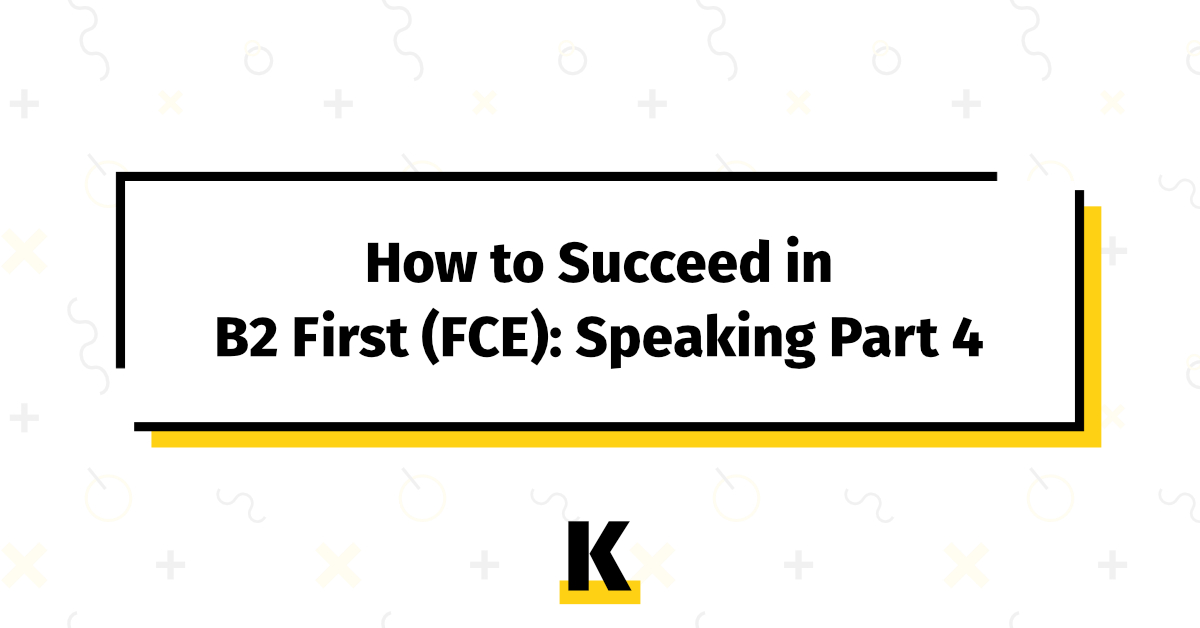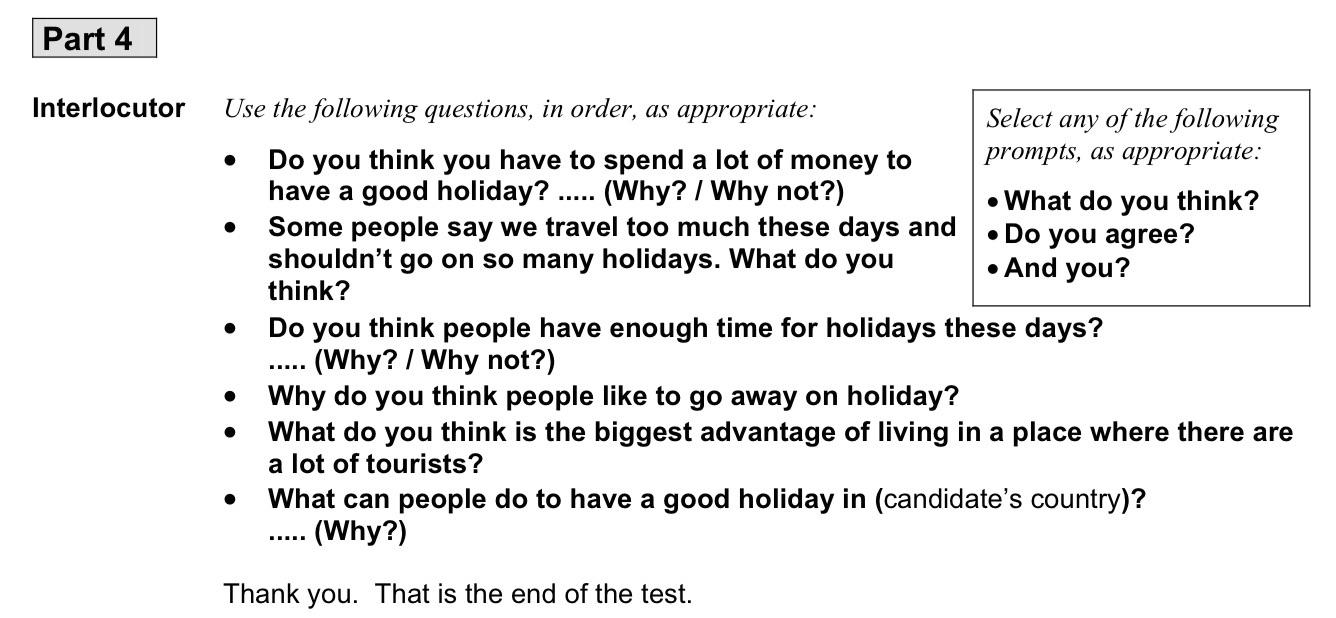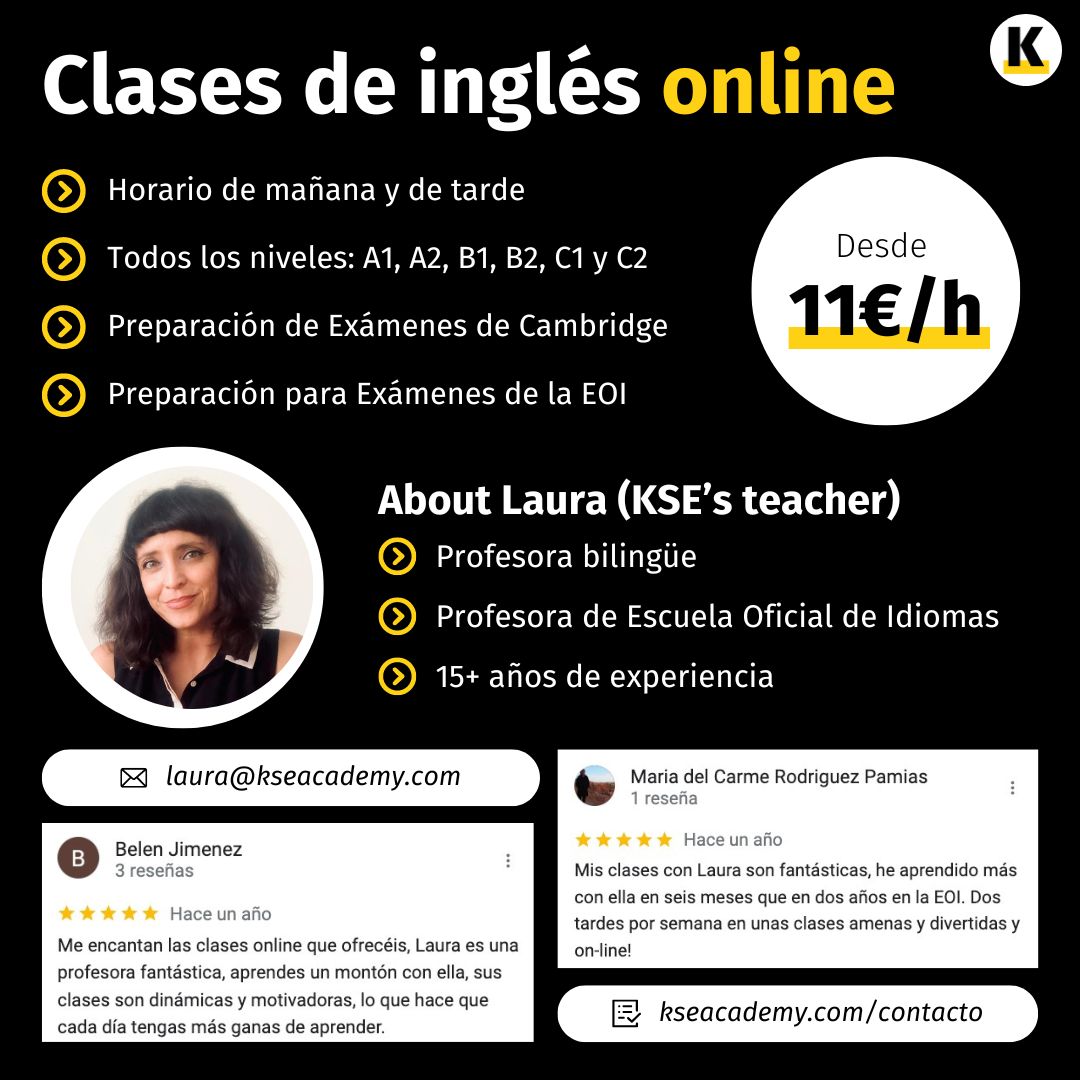In this article, I will focus on FCE Speaking Part 4, which is the last part of the B2 First Speaking test. Since we have already focused on all the other parts (FCE Speaking Part 2, Part 3 & Part 1), it is now time for me to provide a clear description of this part as well as a sample question/answer, so you get a better idea of what you will face when you’re doing this exam.

Description of FCE Speaking Part 4
Part 4 of the B2 First Speaking test basically consists of a set of questions which candidates have to respond to. While at first glance, it is similar to Part 1, it is actually a blend between Part 1 (interview) and Part 3 (discussion). Here are the main features of this part:
- The examiner will typically ask between 4 and 6 questions.
- These questions stem from the topic in part 3. So if you’ve been discussing tourism in your city in Part 3, the topic of Part 4, at least at the start, will be tourism.
- The examiner can address the question to one candidate and then the other one (E.g.: And what do you think, Candidate B?), or they can ask the question to both at the same time and ask them to discuss the question together. NOTE: in this case, the examiner will prompt a discussion between the candidates using a hand gesture.
In general, questions in Part 4 normally touch on complex issues like education, learning, healthy habits, careers, new technologies, etc. The candidates are expected to develop extended answers and, as specified above, may be prompted to exchange views rather than answer the questions individually.
Timing of the B2 First Speaking Part 4
B2 Speaking Part 4 is meant to last 4 minutes (pairs) or 6 minutes (trios). However, while that is the total length of this part, questions are not timed per se. This means that each question isn’t timed individually and their length in time depends on how the candidates develop their answers.
Examiner’s questions and sample Candidate answers or discussions
In Speaking Part 4, there aren’t any specific instructions beyond the examiner’s questions, which, as I said earlier, will stem from the topic discussed in Part 3. Let’s now take a look at a set of sample questions and answers:

– Examiner: Do you think you have to spend a lot of money to have a good holiday?
– Candidate A: I honestly don’t think so. It’s true that travelling can be expensive, but there are also some inexpensive ways of visiting other countries, like cheap flights, or you can always have a vacation in your own country.
– Examiner: What do you think, Candidate B?
– Candidate B: I agree with Candidate A, but I do believe that it’s difficult. Not impossible, but difficult, because when you’re on holiday you always want to do as much as possible, so it’s difficult to make money last.
– Examiner: Some people say we travel too much these days and shouldn’t go on so many holidays. What do you think?
– Candidate B: Well, that’s probably true. Travelling is quite popular nowadays because most people can do it and it’s great. But it’s true that so much tourism can have a negative impact on some places or even cultures, don’t you think, Candidate A?
– Candidate A: That’s a very good point and not many people think about that. So yeah, I agree that we travel too much, but I don’t think we can do anything to prevent it nowadays.
– Examiner: Do you think people have enough time for holidays these days?
– Candidate A: Well, most people are quite busy, but thankfully, we all have some time off work or college, so we make the most of that time to go on holiday. At least, that’s my case. What about you, Candidate B?
– Candidate B: Yes, most of us have enough time to go on holidays at least once a year. I think that those who don’t go away it’s really because they can’t afford it. Who doesn’t like a holiday?
– Examiner: Why do you think people like to go away on holiday?
– Candidate B: Well, it’s a change from routine, and you can also have many great experiences while you’re on holiday. You can do things that you can’t do at home or in your town, especially because most of the time you would be busy working or studying.
– Examiner: What do you think, Candidate A?
– Candidate A: I think Candidate B has made a great point. Holidays are special because they’re different and enjoyable. They help us recharge our batteries and come back fresher than ever to our regular lives. And they’re the best time to live different experiences and get to know other cultures.
Basic observations for B2 First (FCE) Speaking Part 4
After reading the sample above, let’s make a few basic observations about this part:
- Question complexity: The questions asked in Part 4 are more difficult than those in Part 1, as they deal with more complex topics. For these reasons, candidates are expected to provide more extended and accurate answers. This also means that the grammar and vocabulary expected of candidates needs to be good enough to deal with these types of questions.
- Time to shine: You can obviously shine throughout the whole test, but Part 4 is probably the best opportunity for candidates to give answers that are organised and insightful, having more freedom to try to impress the examiners.
- Interaction: Apart from answers being more complex, candidates are expected in most cases to successfully interact with one another, as the examiner can prompt them to discuss the question together rather than provide individual answers. Therefore, it is also necessary to use appropriate discourse markers and interaction devices which facilitate a discussion with the other candidate.
- Timing: Depending on how candidates are answering the different questions, the examiner will decide to ask the whole set, skip some or stop asking before the set is complete.
FCE Speaking Part 4: Useful Phrases to Face Part 4
In this section, we’ll go over some useful phrases that you can use in any discussion. In fact, these phrases are also recommended for Speaking Part 3. Let’s take a look at them now. I’ve divided them into different sections depending on when we would use them:
Starting your discussion
- Shall I start? / Yeah, go on.
- Shall I go first? / Of course, go ahead.
- Is it okay if I start? / Sure, no problem.
- Would you like to go first? / Yes, why not?
Expressing your opinion
- I believe/think that…
- In my opinion,…
- The way I see it,…
- If you ask me,…
- I would say that…
- It seems to me that…
- In my view…
- As far as I’m concerned,…
Asking for your partner’s opinion
- statement, don’t you think/agree?
- statement, wouldn’t you say so?
- statement , wouldn’t you agree?
- statement, right?
- Do you think…?
- Do you believe that…?
- What do you think about…?
- How about…?
- What about…?
- What’s your take on…?
Agreeing with your partner
- I (totally) agree with you.
- You’re dead right.
- That’s (absolutely) true.
- You’re (absolutely) right.
- That’s a great idea.
- I couldn’t agree more.
- Yes, I see what you mean.
- I see it that way, too.
- Yes, of course.
- I think so, too.
Disagreeing with your partner
- I’m afraid I don’t see it the same way.
- I’m sorry but I have to disagree.
- You may be right, but I have a different view.
- That might be true, but I’m not sure I agree with you.
- I’m sorry, but I don’t agree.
Top 10 Tips for FCE Speaking Part 4
- Pay close attention to the question and to your partner: As described above, the questions in Speaking Part 4 can be complex and insightful. That is why paying close attention to understand the question properly is specially important in this case. In addition, you must always be aware of what your partner is talking about because you will most likely have to react to their opinions.
- Justify your opinions: Justifying your opinions is just as important as being able to express them. Firstly, you are proving that you can support your opinions with arguments in English, and secondly, you are providing the other candidate with conversation material to keep the discussion going.
- Work with your partner: Always remember that your partner is not your enemy. You will both be assessed separately, so you must see him or her as your ally.
- Help your partner: If, for some reason, the other candidate is struggling to find the appropriate words or ideas to express, you can give them a hand by stepping in with some ideas or guessing the words you think they are looking for. Not only will this help the conversation itself, it will also show the examiner that you have great communication skills.
- Step up your interaction skills: Apart from responding to questions appropriately, you are expected to interact with your partner or, at the very least, react to their answers. For this reason, you ought to know how to use a set of expressions that will make a good impression. So try to avoid the typical “What do you think about…?” or “I agree/disagree”, and go for something a little more advanced, such as “wouldn’t you agree?”, or “I’m afraid I don’t hold the same opinion.”
- Stick to the topic, but don’t fall short: make sure that you stick to the topic and answer exactly what the examiner asked, but also be sure to extend your answer until you have provided one that fully deals with it.
- Finish your statements with a question or a question tag: When speaking to your partner, try to finish your statements with a question tag, as it’s a very natural way of keeping the conversation flowing.
- Address your partner or the examiner appropriately: remember that you are having a conversation with someone, whether it be the examiner or the other candidate. While speaking, be sure to look at the other person as you speak.
Bonus Tip
- Be polite & smile: You’d be surprised by what human beings can achieve with politeness and a smile. A positive, cheerful attitude will make you cause a better impression on the examiners and your partner, plus it makes you, to some extent, a better communicator.
Video of a Real FCE Speaking Part 4
Now you’ve read all the description and tips to successfully deal with FCE Speaking Part 4, it’s a great idea for you to see exactly how this part feels, and what better way to do so safely than to see other people doing it! So check out this video and let me know in the comments if you have any questions! NOTE: This is a full test video, so if you just want to see Part 4, go to minute 10:30, which is where Part 3 ends.

